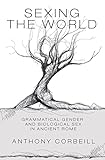Sexing the World : Grammatical Gender and Biological Sex in Ancient Rome / Anthony Corbeill.
Material type: TextPublisher: Princeton, NJ : Princeton University Press, [2015]Copyright date: ©2015Edition: Course BookDescription: 1 online resource : 1 tableContent type:
TextPublisher: Princeton, NJ : Princeton University Press, [2015]Copyright date: ©2015Edition: Course BookDescription: 1 online resource : 1 tableContent type: - 9780691163222
- 9781400852468
- 870.93538 23
- PA6029.E87 C67 2017
- online - DeGruyter
- Issued also in print.
| Item type | Current library | Call number | URL | Status | Notes | Barcode | |
|---|---|---|---|---|---|---|---|
 eBook
eBook
|
Biblioteca "Angelicum" Pont. Univ. S.Tommaso d'Aquino Nuvola online | online - DeGruyter (Browse shelf(Opens below)) | Online access | Not for loan (Accesso limitato) | Accesso per gli utenti autorizzati / Access for authorized users | (dgr)9781400852468 |
Frontmatter -- Contents -- Acknowledgments -- Introduction: Latin Grammatical Gender Is Not Arbitrary -- Chapter 1. Roman Scholars on Grammatical Gender and Biological Sex -- Chapter 2. Roman Poets on Grammatical Gender -- Chapter 3. Poetic Play with Sex and Gender -- Chapter 4. Androgynous Gods in Archaic Rome -- Chapter 5. The Prodigious Hermaphrodite -- Abbreviations -- Works Cited -- Index Locorum -- General Index
From the moment a child in ancient Rome began to speak Latin, the surrounding world became populated with objects possessing grammatical gender-masculine eyes (oculi), feminine trees (arbores), neuter bodies (corpora). Sexing the World surveys the many ways in which grammatical gender enabled Latin speakers to organize aspects of their society into sexual categories, and how this identification of grammatical gender with biological sex affected Roman perceptions of Latin poetry, divine power, and the human hermaphrodite.Beginning with the ancient grammarians, Anthony Corbeill examines how these scholars used the gender of nouns to identify the sex of the object being signified, regardless of whether that object was animate or inanimate. This informed the Roman poets who, for a time, changed at whim the grammatical gender for words as seemingly lifeless as "dust" (pulvis) or "tree bark" (cortex). Corbeill then applies the idea of fluid grammatical gender to the basic tenets of Roman religion and state politics. He looks at how the ancients tended to construct Rome's earliest divinities as related male and female pairs, a tendency that waned in later periods. An analogous change characterized the dual-sexed hermaphrodite, whose sacred and political significance declined as the republican government became an autocracy. Throughout, Corbeill shows that the fluid boundaries of sex and gender became increasingly fixed into opposing and exclusive categories.Sexing the World contributes to our understanding of the power of language to shape human perception.
Issued also in print.
Mode of access: Internet via World Wide Web.
In English.
Description based on online resource; title from PDF title page (publisher's Web site, viewed 23. Mai 2019)


